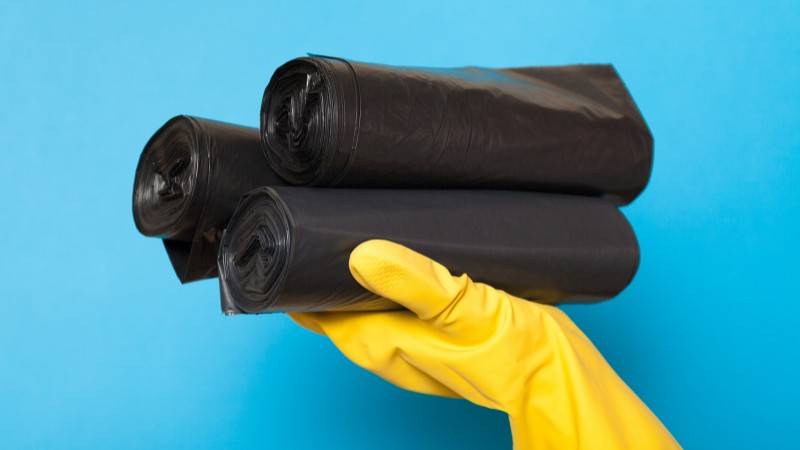Did you know that we generate a staggering 300 million tons of plastic waste every year? That’s nearly equivalent to the weight of the entire human population!
Among this mountain of plastic, a common household item we frequently overlook is the trash bag. But here’s a pressing question: are trash bags recyclable? It’s a simple question, but the answer might surprise you.
In this blog, I’m going to unravel the truth about recycling trash bags and guide you through the complexities of what seems like a simple daily chore.
We’ll explore why trash bags pose a unique challenge in the recycling world, and I’ll share sustainable alternatives that can help us all tread a little lighter on our planet.
Are Garbage Bags Recyclable?
In short, most plastic trash bags are not recyclable through curbside programs. I know, it’s a bit disappointing considering how many of these bags we use. These bags are typically made of low-density polyethylene (LDPE), which is technically recyclable. However, they tend to clog the machinery at recycling facilities, which is why many places don’t accept them.
But wait, there’s a bright side!
Compostable trash bags are becoming increasingly popular as an eco-friendly alternative. Unlike traditional plastic trash bags, compostable trash bags are designed to break down in composting conditions, helping us to reduce our waste footprint significantly.
So, while it’s generally a ‘no’ for trying to recycle plastic trash bags through regular curbside programs, we do have more sustainable options on the horizon.
And that’s exactly what we need if we’re aiming for a greener future, don’t you think?
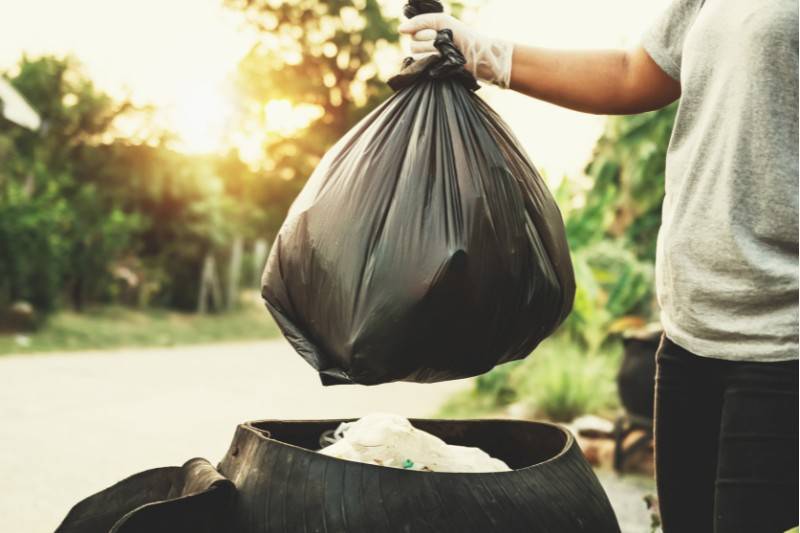
The Reality of Trash Bag Recycling
Why Recycling Trash Bags is Complicated
Ever wondered why, despite being made of plastic, trash bags often don’t make it into our recycling bins?
Well, it’s not as straightforward as it seems.
For starters, plastic trash bags can cause severe problems at recycling facilities. They often get tangled in the recycling machinery, leading to costly and time-consuming shutdowns.
This is why many recycling plants hesitate to accept trash bags and other flexible plastics.
On top of this, not all trash bags are clean; some are contaminated with food scraps and other waste, making them unsuitable for the recycling stream.
Common Materials Used in Trash Bags
Now, let’s talk about what trash bags are made from. The most common materials include:
- Low-Density Polyethylene (LDPE)
- High-Density Polyethylene (HDPE)
- Polyethylene Terephthalate (PET)
- Polypropylene (PP)
- Polystyrene (PS)
These are types of plastic that, under ideal circumstances, can be recycled. But, as we’ve just seen, their journey from your trash bin to a recycling plant is fraught with complications.
Here’s a simple table to break down the materials and their recyclability:
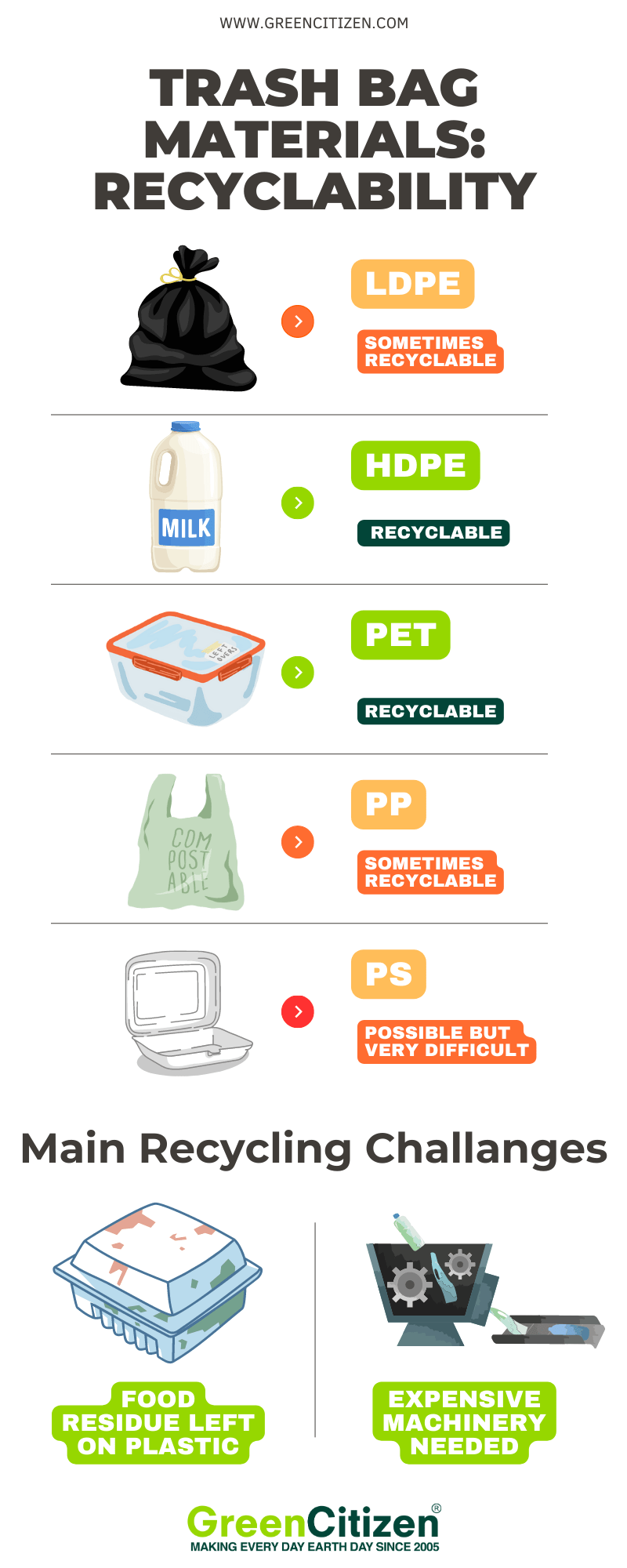
Keep in mind that while these materials can be recycled, it doesn’t mean they always are. The reality is that many end up contributing to plastic pollution, despite our best intentions.
So, even when you toss your plastic garbage bags into the recycling bin with a hopeful heart, the complex and sometimes inefficient recycling process doesn’t always lead to them being transformed into recycled plastics.
This is why alternative options, like compostable bags and a focus on zero waste, are gaining attention as we strive to reduce our environmental footprint.
Are Your Plastic Trash Bags Recyclable?
Reading and Understanding Recycling Symbols
Ever noticed those little numbers inside the recycling symbols on your trash bag boxes? They’re not just there for decoration; they have an important purpose.
These symbols, known as Resin Identification Codes, tell you what type of plastic your bags are made from, which is key to knowing whether they can be recycled.
Here’s a quick guide:
- #1 PET (Polyethylene Terephthalate): Commonly recycled, often into new bottles or fibers for clothing.
- #2 HDPE (High-Density Polyethylene): Widely recycled, used in sturdier trash bags and plastic bottles.
- #3 PVC (Polyvinyl Chloride): Rarely recycled due to its toxic components.
- #4 LDPE (Low-Density Polyethylene): Sometimes recycled; your typical plastic grocery bags and softer trash bags.
- #5 PP (Polypropylene): Increasingly recyclable, used in yogurt containers and some compostable bags.
- #6 PS (Polystyrene): Rarely recycled, known as Styrofoam.
- #7 Other (Miscellaneous Plastics): Includes a variety of plastics, less commonly recycled.

Read More:
Checking with Local Recycling Programs
Not all recycling bins are created equal – what’s accepted in your friend’s neighborhood might not be accepted in yours. It’s crucial to check with your local municipality or private service provider to understand the specific recycling policies in your area.
Maybe your curbside recycling bin won’t accept plastic trash bags, but a nearby grocery store has a designated bin for clean plastic bags, including plastic trash bags. Or perhaps your local waste management facility has a program for recycling plastic bags and wraps.
So, before tossing your trash bags into the recycling bin and hoping for the best, do a little research. It’s a simple step that can help us make a big difference in reducing our carbon footprint and contributing to a more environmentally friendly future.
After all, every effort counts when we’re aiming to use fewer trash bags and recycle more!
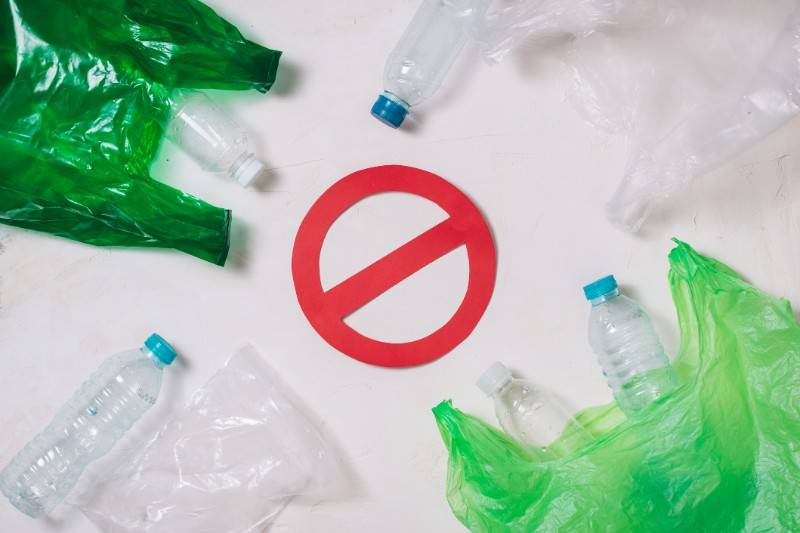
Alternatives to Traditional Trash Bags
We’ve learned that recycling plastic trash bags isn’t as straightforward as we might have hoped.
So, what can we do to lower our environmental footprint?
Here are some alternatives that can help you use fewer trash bags and generate less plastic waste.
Biodegradable Trash Bags
Biodegradable trash bags are designed to break down much more quickly than traditional plastic bags.
They are made from materials like cornstarch or sugarcane. These materials transform into natural substances like water and carbon dioxide through the action of bacteria and enzymes.
Unlike regular plastic bags, which can take hundreds of years to decompose, biodegradable bags break down in a fraction of that time. But keep in mind that “biodegradable” doesn’t necessarily mean “compostable.”
Always check labels and local waste management policies.
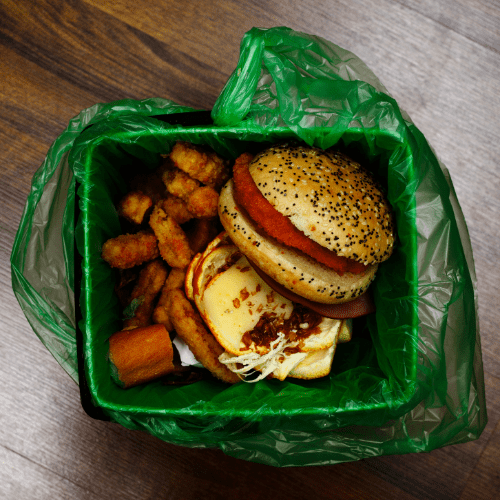
Compostable Trash Bags
If you’re aiming for zero waste, compostable trash bags might be your new best friend.
They’re made from compostable plastics, paper, or natural fibers, which means they can be thrown into your compost bin along with your food scraps and yard waste.
Unlike biodegradable bags, compostable bags are designed to turn into nutrient-rich compost that can be used to nourish your garden.
They are a wonderful alternative if your goal is to reduce your carbon footprint and plastic pollution, but they typically require specific composting conditions to break down completely.
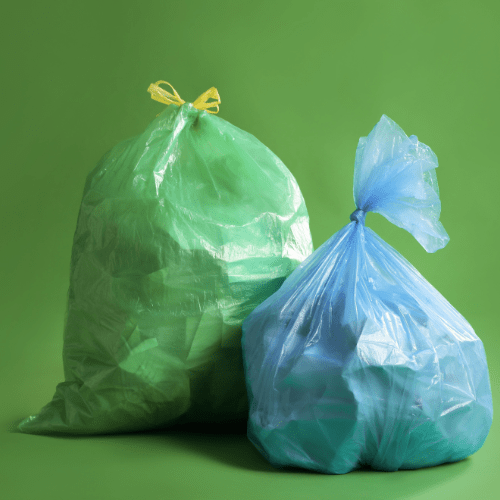
Reusable Trash Bin Liners
One step closer to a world with less plastic waste is to opt for reusable trash bin liners.
These are usually made from waterproof, washable materials that can stand up to regular use without tearing.
Think of it as having a permanent trash bag that you can empty, clean, and use again. These liners are a great way to completely eliminate the need for disposable plastic garbage bags in your household.

Read More:
How to Properly Dispose of Non-Recyclable Trash Bags
So, we’ve figured out that not all trash bags are recyclable. It’s a hard pill to swallow when we’re trying to do our best for the environment.
What are the options then for these non-recyclable garbage bags like black trash bags?
Let’s explore.
Disposal Methods for Trash Bags
If your trash bags aren’t recyclable or compostable, it’s crucial to dispose of them responsibly.
First, ensure your plastic trash bags are free of food scraps or recyclable materials; those can go into composting or recycling streams. When you have to use a plastic trash bag, tie it securely to prevent its contents from spilling and creating more litter.
Never leave plastic bags on the side of the road or in nature; always place them in a designated trash can or waste bin.
For larger quantities of plastic waste, check if your local waste management facility has a special drop-off point for non-recyclable plastics. Some grocery stores also have designated bins for plastic bags and wraps, which are often recycled into new plastic products.
Reducing the Use of Trash Bags
One of the most impactful ways we can lower our environmental footprint is by using fewer trash bags. Here are some practical tips:
- Reuse plastic bags: If your grocery stores provide plastic bags, use them as trash bags instead of buying new ones.
- Use compostable bags or biodegradable trash bags: Swap out your regular garbage bags for those made from recycled plastic or materials that break down more naturally.
- Try a reusable trash bin liner: Replace single-use plastic garbage bags with a washable, reusable alternative.
- Recycle when possible: Always separate your recyclable materials and place them in your recycling bin rather than the trash.
- Composting: Start a compost pile or bin for organic waste to reduce the volume of trash and the number of bags you use.
- Buy products with minimal packaging: Choose items that have less packaging or packaging made from recycled materials to reduce the amount of trash you produce.
- Bring your own bags to grocery stores: Use reusable shopping bags to cut down on the number of plastic bags you bring home.
By embracing these habits, you’ll contribute less to the growing mountains of plastic waste and lower your contribution to the demand for virgin plastics.
Supporting Policies for Trash Bag Recycling
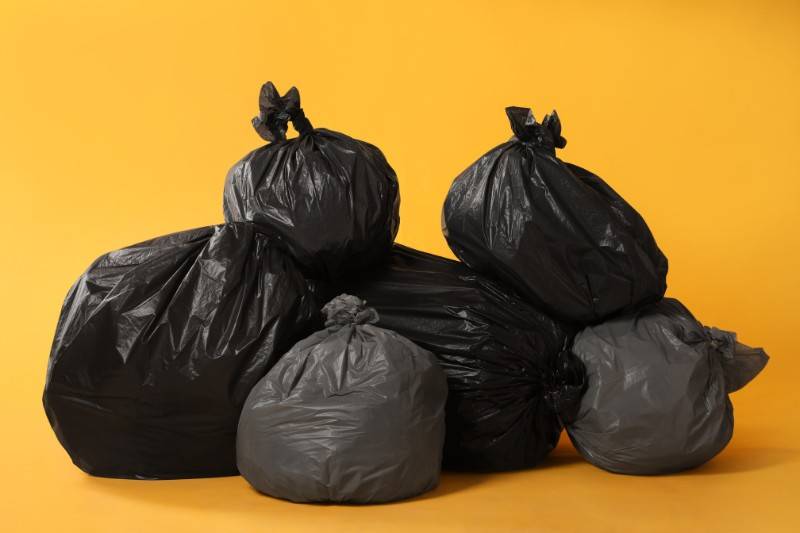
To promote the idea that bags are recyclable, including the plastic trash bags we use daily, consider becoming an advocate for change.
Start by researching and supporting policies that favor the recycling of trash bags and other plastic waste.
Engage with your local representatives and senators; tell them you are concerned about plastic waste and want to see more recycling plants designed to handle plastic bags.
Attend town hall meetings or write to your local newspaper to express your views.
Join or donate to environmental groups that lobby for stronger recycling regulations and that fight against the excessive use of non-recyclable materials.
Encourage grocery stores to take back used plastic bags for recycling, and applaud those that already have recycling bins designated for this purpose.
The Role of Companies and Manufacturers
Companies play a pivotal role in determining whether trash bags are recyclable. They are the ones producing these bags, and they have the capacity to significantly reduce plastic waste. For instance, companies can opt to produce recycled trash bags made of recycled plastic, or they could create bags designed to decompose, such as compostable bags or biodegradable trash bags.
This way, fewer trash bags would end up in our waste streams and, consequently, in our environment.
Manufacturers can also invest in technology to produce bags that can be recycled with ease, making it simpler for consumers to dispose of them in an environmentally friendly manner. Additionally, they have the responsibility of clearly labeling their bags, indicating whether they are recyclable, and providing disposal instructions.
For instance, Company A has been leading the market with its 100% recycled plastic bags, while Company B is setting a new standard with its compostable waste bags. Company C is also noteworthy for producing black trash bags that are recyclable and made from 50% recycled materials.
By choosing to purchase from these companies, you are voting with your dollars for a cleaner planet and encouraging the production of more sustainable options, thus decreasing the environmental footprint associated with our waste disposal needs.
Frequently Asked Questions (FAQ): Trash Bag Recycling
No, plastic trash bags are generally not recycled through curbside programs, but some grocery stores accept clean plastic bags for recycling.
Yes, look for trash bags labeled with a #2 (HDPE) or #4 (LDPE) recycling symbol.
Typically, no. The dark color makes it difficult for recycling facilities to process them.
Generally, no, not through curbside recycling. Some stores may accept clean and dry white plastic bags for recycling.
No, biodegradable trash bags are designed to break down more quickly, but they are not typically recyclable.
Mostly, no. Check with your local recycling program or look for store-specific recycling bins for clear plastic bags.
Conclusion: Are Trash Bags Recyclable?
Traditional plastic trash bags are generally not recyclable through regular curbside programs. While they are made of plastic, their composition and color often make them unsuitable for recycling plants. However, this doesn’t mean we are left without options to make a positive impact.
First and foremost, we can opt for alternatives to traditional trash bags. Consider biodegradable or compostable bags, which break down much faster than typical plastic bags. Additionally, reusable trash bin liners are an effective and sustainable alternative, eliminating the need for disposable bags altogether.
In summary, while trash bags themselves may not be a widely recyclable item, we are far from powerless. Through informed decisions and conscientious action, we can navigate around this challenge and contribute to a cleaner, more sustainable world.

